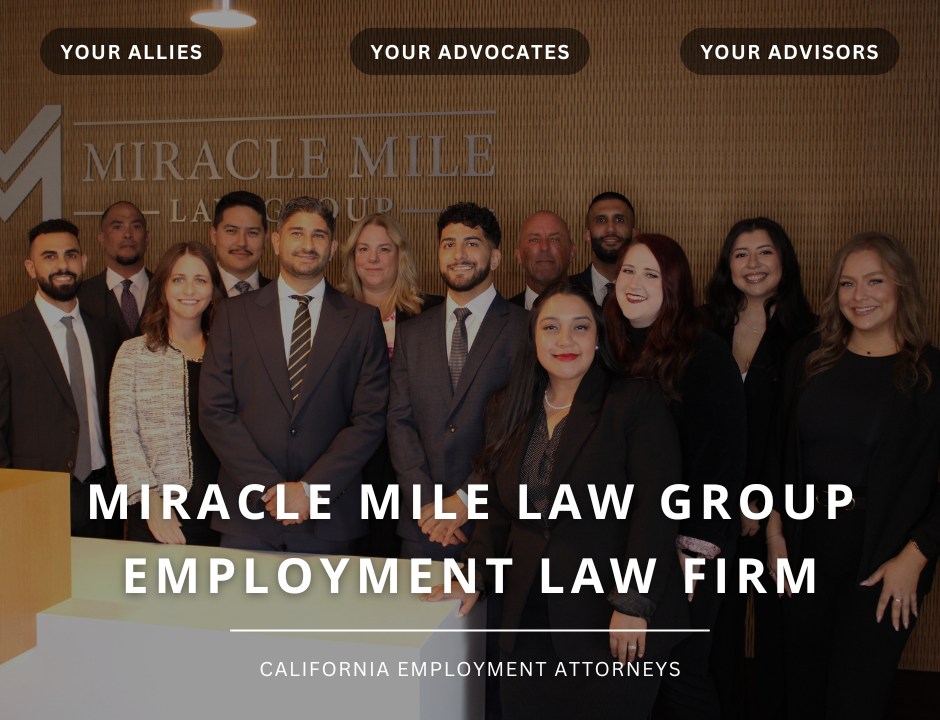
Big Win: Miracle Mile Law Group Sets New Standard in Hostile Work Environment Law
Miracle Mile Law Group is proud to announce a landmark victory in the California Court of Appeal, Fifth Appellate District, in Kruitbosch v. Bakersfield Recovery Services, Inc. In this case, our team successfully reversed the trial court’s dismissal of our client’s claims, securing a ruling that not only vindicated his rights but also established binding precedent under the Fair Employment and Housing Act (FEHA).
The Court certified its opinion for partial publication, making this decision a guiding authority for courts throughout California. This is a rare and important development—published decisions shape the law statewide, not just for the parties involved.
Case Background
Our client, Steven Kruitbosch, worked as an assistant corporate compliance officer at Bakersfield Recovery Services (BRS), a provider of substance abuse treatment services. While employed there, Steven was subjected to deeply disturbing sexual harassment by a coworker, Lisa Sanders.
Sanders sent him unsolicited nude photographs, sexually propositioned him, and even appeared uninvited at his home with sexually explicit intentions. At one point, she left a cucumber with a condom attached in his driveway—an act designed to humiliate and intimidate him. Sanders also preyed on Steven’s recovery status by offering him drugs in an attempt to pressure him further.
When Steven reported this behavior to BRS management and human resources, the company refused to act. Instead of protecting him, the HR representative mocked him publicly on social media and even made sarcastic comments about the nude photos he had received. With no action taken to protect him in the workplace, Steven was left to fend for himself, experiencing constant anxiety, humiliation, and fear.
Unable to endure the situation any longer, Steven resigned. He then brought legal action under FEHA for harassment, discrimination, retaliation, and related claims.
The Trial Court’s Ruling
Initially, the Kern County Superior Court dismissed Steven’s claims, holding that because the harassment had occurred away from the workplace and outside of work hours, it was not covered by FEHA. The trial court also concluded that BRS’s failure to act did not amount to an adverse employment action and therefore dismissed several of his claims with prejudice, leaving him with no path forward at the trial level.
The Court of Appeal’s Decision
On appeal, Miracle Mile Law Group attorneys—including Caitlyn Handy, who argued before the Court of Appeal—successfully demonstrated that the trial court’s ruling was legally flawed.
The Court of Appeal held that an employer’s response—or lack of response—to harassment that occurs outside the workplace can itself create a hostile work environment under FEHA. This is a first-of-its-kind published decision in California.
Specifically, the Court explained that while Sanders’s conduct outside of work was reprehensible, the decisive legal issue was BRS’s response. By dismissing Steven’s complaints, mocking him, and refusing to take corrective measures, BRS altered the conditions of his workplace in a way that was objectively severe.
The Court compared this case to federal precedent, where employer inaction following off-site harassment or assault has been found to create liability. Ultimately, the Court ruled that Steven’s hostile work environment claim and his claim for failure to prevent harassment were valid and must proceed.
Although the Court affirmed dismissal of certain other claims (such as constructive termination and discrimination), its recognition that employer inaction in response to off-site harassment can constitute workplace harassment under FEHA sets a powerful precedent.
Why This Case Matters
This decision is a watershed moment for California employment law. It establishes that:
- Employers cannot ignore harassment complaints simply because misconduct happens “off the clock.”
- The employer’s response—or failure to act—is itself part of the workplace environment.
- Mocking, minimizing, or dismissing complaints can create liability under FEHA.
For California employees, this means broader protections. Workers now have stronger grounds to hold employers accountable if they fail to respond adequately to harassment, no matter where the underlying conduct occurs.
For employers, this case serves as a clear warning: inaction is not an option. When harassment is reported, employers must investigate, take corrective action, and ensure the workplace remains free from hostility.
Our Team’s Role
We extend a special congratulations to Caitlyn Handy, who delivered a compelling and masterful oral argument before the Court of Appeal. Her advocacy was instrumental in securing this groundbreaking ruling that will safeguard employees across the state.
This victory reflects Miracle Mile Law Group’s ongoing commitment to protecting workers’ rights and advancing California employment law. By pushing the law forward, we help ensure that all employees—regardless of gender, position, or circumstance—are entitled to safe, respectful, and harassment-free workplaces.
Looking Ahead
The Kruitbosch decision is now a binding precedent for California courts. It will guide how harassment cases are evaluated for years to come, influencing outcomes for countless workers who might otherwise have been left unprotected.
At Miracle Mile Law Group, we are honored to have represented Steven and to have played a role in strengthening workplace protections statewide. We remain steadfast in our mission to fight for employees, hold employers accountable, and ensure justice under the law.
–
Frequently Asked Questions (FAQ) About the Kruitbosch Decision
Q: What was the main issue in this case?
The central question was whether harassment that occurs outside the physical or digital workplace can still give rise to liability under the Fair Employment and Housing Act (FEHA). The Court of Appeal held that while the off-site harassment itself may not always be imputable to the employer, the employer’s response—or failure to act—can create a hostile work environment.
Q: What does this mean for California employees?
Employees now have stronger protections. If you are harassed by a coworker or supervisor outside of work and your employer refuses to address it, dismisses your complaint, or mocks you for reporting it, you may still have a valid harassment claim. Employers are required to take complaints seriously, regardless of where the misconduct occurs.
Q: How does this ruling affect employers?
Employers can no longer hide behind the excuse that harassment happened “off the clock.” Their duty to maintain a workplace free from harassment includes how they respond to employee complaints about off-site misconduct. Failing to investigate, dismissing complaints, or retaliating against the reporting employee can create liability under FEHA.
Q: How is this decision different from previous law?
Before this ruling, California courts had not squarely addressed whether an employer’s response to off-site harassment could itself constitute workplace harassment. This case is the first published opinion to hold that employer inaction or mockery following such a complaint can alter the conditions of employment and create liability.
Q: What should an employee do if they experience harassment outside of work?
Employees should report the misconduct to their employer as soon as possible and keep a written record of their complaint. If the employer fails to act or retaliates, the employee may have legal recourse under FEHA. Speaking with an experienced employment law attorney can help clarify options.
Q: What steps should employers take to comply with this ruling?
Employers should:
- Ensure their harassment policies cover off-site and off-duty conduct that affects the workplace.
- Take all complaints seriously, regardless of where the misconduct occurred.
- Investigate promptly and thoroughly.
- Avoid mocking or retaliating against the complaining employee.
- Provide training to HR staff and supervisors to reinforce these obligations.
Q: Why is this case significant statewide?
Because the Court certified its opinion for publication, it is now binding precedent in California. Courts across the state must follow this ruling when evaluating harassment claims, meaning the decision will impact countless future cases and expand workplace protections for employees statewide.


